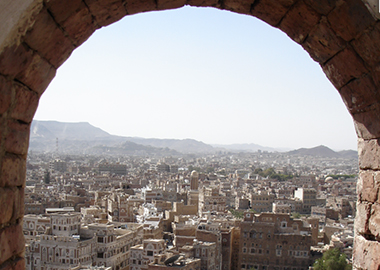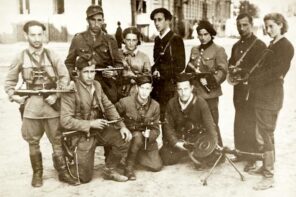I tell him that Jews don’t eat anything leavened during Passover, to remember that we fled Egypt in such a rush we couldn’t even let the bread finish rising. The eight-day holiday is about remembering this historical moment—Exodus, our liberation from slavery in Egypt—and also about seeing the world as a stranger, through someone else’s eyes.
Khalid and I take a break from the cramped newsroom where we work for lunch. I’m an editor at an English newspaper in Sana’a and he’s a translator. Khalid is a wiry, gentle man who owns one suit that he wears every day. There have been reports (still unverified) of clashes with Al-Qaeda in the south, a story about drone strike in Marib, just two hours to the east, is also emerging. But lunch is a very important time in Yemen. Three other reporters join us and we order rice, salta—a traditional Yemeni lamb dish—chicken, soup and piles of fresh bread.
Because of Pesach, I don’t touch the bread. I’m eating my salta with a spoon instead of scooping it with a handful of bread and Khalid raises his eyebrows. In Yemen, a meal without bread is not a meal. Yemenis don’t typically speak during meals and it’s only after we finish, wash our hands, pay, pick our teeth clean with toothpicks, and begin walking back to the office that Khalid asks me about the bread.
“It’s a Jewish thing,” I say. “This week is a special holiday for Jews.”
“You?” Khalid nods towards me, his eyebrows rising slightly. I hadn’t yet told Khalid or anyone else that I met in Yemen that was a Jew. It hadn’t come up, it didn’t matter, I told myself. But I was also afraid of how they would react.
I’d seen graffiti on the sides of buildings and heard children shouting in the street, almost playfully, the rallying cry of the separatist Zaidi Shia group, the Houthis: God is great, death to America, death to Israel, curse the Jews, victory for Islam. Part of me knew this was politics, the language of demagogues, but still I wondered, would the friends that I had made turn on me, curse me?
“So, Passover is the story of Moses, Musa,” Khalid says, smiling. He knows the story, of course. “These are our prophets, too.” I feel relieved and also silly for hesitating to tell him about my heritage.
“Do you know the story of Sana’a?” Khalid asks.
It was Shem, Noah’s son, Moses’ ancestor, who founded the city. After the flood, Noah’s children were instructed to repopulate the earth. Humanity had been given a second chance. Shem wandered through the desert, following the flight of a bird that led him south to a wide valley where Sana’a now sits.
Khalid points to a jagged mountain rising above the city. “Shem came from there.” It almost sounds like he’s talking about something that just happened, like Shem could be coming to visit this afternoon. Times seem to overlap—the ancient bubbling into the present, the mythical figures of Moses and Shem just men like Khalid and me, bearded desert men, trying to find the signs of God in the world around them.
Word travels around the office that I’m Jewish. The next day, another co-worker named Mohammed and I talk about Judaism. “I have friends and family in Israel,” he says. “My family is Jewish.”
“But your name is Mohammed,” I observe.
“We converted generations ago,” he waves his hand back, as if pointing to someone behind him. It’s the distant past, but he still feels Jewish, he tells me. Had my ancestors and Mohammed’s wandered in the desert together, looking for a Promised Land?
A third friend, Ahmed, wears his hair long, dresses in the traditional dress of northern tribesmen and tells me that he admires the Houthis (the curse the Jew people) because they are anti-imperialist, because they stand for a strong, sovereign Yemen.
Ahmed is a teenager, but already has a thick goatee. When I tell him I’m a Jew he takes out his iPhone and wants to play me a song. Hebrew lettering appears on the bottom of the screen and a yarmulke-clad singer stands on a stage, microphone in hand. When he begins singing, in Arabic, Ahmed knows every word. He sings about chewing qat, about falling in love.
“Most of the Jews here went to Israel, but they stayed Yemeni—listen to his accent! He’s a perfect Sana’ani. He sounds just like me.” Ahmed doesn’t want to talk about Israel (he scowls when he hears the word), but this music, it’s transcendent. He leans his head back and closes his eyes as the song plays.





